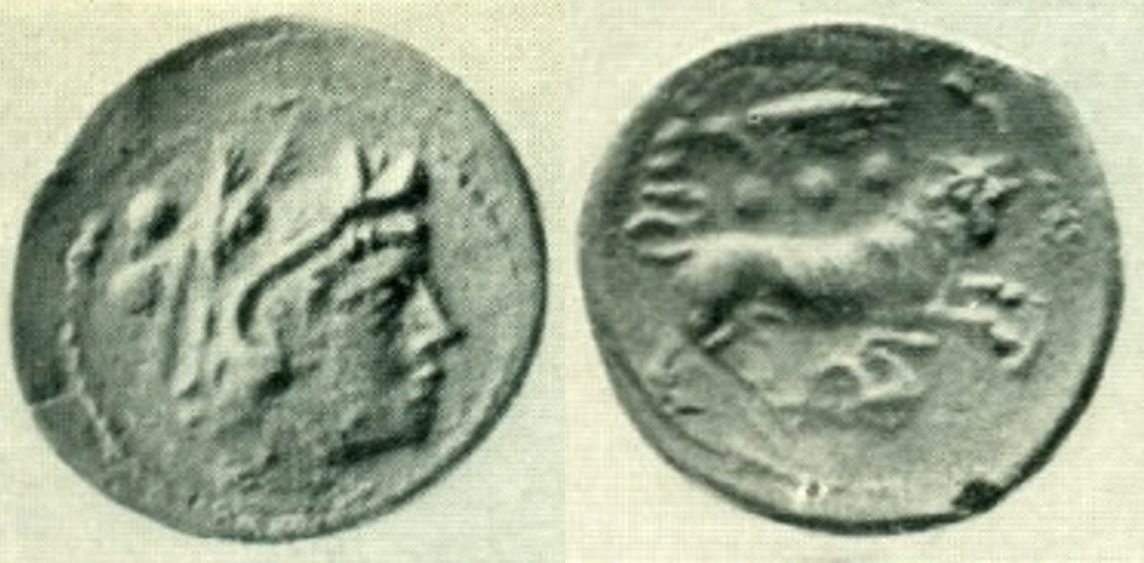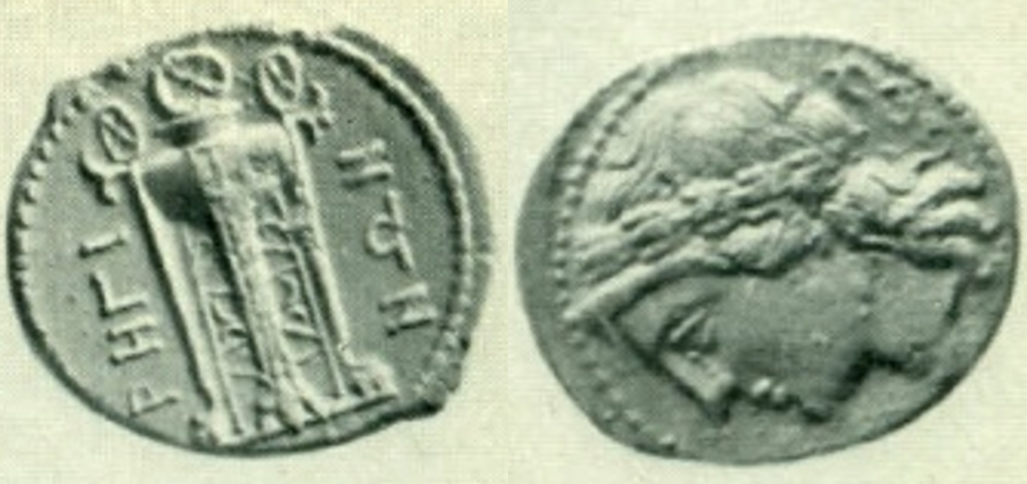SO 1029 - Uncertain mint in Magna Graecia (Sicily) over Rhegium
From SILVER
Revision as of 11:32, 7 June 2024 by Vincent Vieux-Champagne (talk | contribs)
211 BCE - 210 BCE | ROMA
Location/history
| Private collection(s)Private collection(s) ᵖ: | D'Ailly collection, 1439 |
Overstriking coin
Description
| ObverseInscription or printing placed on the obverse.: | Head of Herakles right, wearing boar skin headdress. In left field, 3 pellets (mark of value). | ReverseInscription or printing placed on the reverse.: | ROMA (Latin) Bull charging right. Above, grain ear and 3 pellets (mark of value). Below, serpent. |
Mint and issuing power
| MintIdentifies the place of manufacture or issue of a numismatic object.: | Sicily (uncertain Roman mint) | Ancient regionAncient region. | Sicily | Modern countryModern country: Italy | AuthorityIdentifies the issuing power. The authority can be "pretended" when the name or the portrait of X is on the coin but he/she was not the issuing power. It can also be "uncertain" when there is no mention of X on the coin but he/she was the issuing power according to the historical sources: | Roman Republic |
Chronology
| FromIdentifies the initial date in a range assigned in a numismatic context. 211 BCE toIdentifies the final date in a range assigned in a numismatic context.. 210 BCE | Hellenistic 323-30 BC |
Physical description
| MetalThe physical material (usually metal) from which an object is made.: Bronze |
WeightWeight of the numismatic object (in grams). in grams: 10.9110.91 g <br />10,910 mg <br /> | DenominationTerm indicating the value of a numismatic object. Examples: tetradrachm, chalkous, denarius.: quadrans |
|
References
| Coin referenceReference of the Coin: | Hersh 1953, n°3a | Coin series referenceReference to coin series study: | Sydenham 19521Sydenham 1952, p.10, RRC2RRC, n°69/5, RBW3RBW, n°292 |
| Coin series web referenceCoin series web references: | |||
Overstruck type
Description
| ObverseInscription or printing placed on the obverse.: | Head of Apollo left, wearing laurel wreath. Border of dots. | ReverseInscription or printing placed on the reverse.: | PHΓINΩN (Greek) Tripod. |
Mint and issuing power
| MintIdentifies the place of manufacture or issue of a numismatic object. ᵖ: | Rhegium | Ancient regionAncient region. ᵖ | Bruttium | Modern countryModern country: Italy | AuthorityIdentifies the authority in whose name (explicitly or implicitly) a numismatic object was issued. ᵖ: |
Chronology
| FromIdentifies the initial date in a range assigned in a numismatic context. 260 BCE toIdentifies the final date in a range assigned in a numismatic context.. 215 BCE | Hellenistic 323-30 BC |
Physical description
References
| Coin type referenceReference to coin series study ᵖ: | BMC Italy4BMC Italy, Rhegium, n°73f, SNG ANS 3 Bruttium-Sicily5SNG ANS 3 Bruttium-Sicily, n°716, HN Italy6HN Italy, n°2542-3, HGC 17HGC 1, 1677 | ||
| Coin series web reference overstruckCoin series web references overstruck: | |||
Additional data
| Frequency of overstrikesFrequency of overstrikes: | frequent | Level of confidenceLevel of confidence of the identification: | sure |
| RemarksRemarks: | "overstruck on Rhegium (Apollo l./tripod) ; as B.M.C. Italy , Rhegium 73 f" | ||
References
- ^ Sydenham, Edward Allen (1952), The Coinage of the Roman Republic, London, Spink & Son Ltd., lxix, 343 p., 30 pl.
- ^ Crawford, Michael H. (1974), Roman Republican Coinage, Cambridge
- ^ Russo, Roberto (2013), The RBW Collection of Roman Republican Coins, Numismatica Ars Classica AG, p.407
- ^ Poole, Reginald Stuart (1873), A Catalogue of the Greek Coins in the British Museum. Italy, London, 2 p. l., viii, 432 p.
- ^ Troxell, Hyla A. (1975), Sylloge Nummorum Graecorum ANS 3. The Collection of the American Numismatic Society. Sicily 3 (Bruttium-Sicily I: Abacaenum-Eryx), New-York, pl. 38.
- ^ Rutter N. Keith et alii (eds.) (2001), Historia Numorum Italy, London, xvi, 223 p., 43 pl.
- ^ Hoover, Oliver D. (2018), The Handbook of Greek Coinage Series, Volume 1. Handbook of Coins of Italy and Magna Graecia, Sixth to First Centuries BC., Lancaster-London, 2018, lxi, 527 pages, 23 cm


